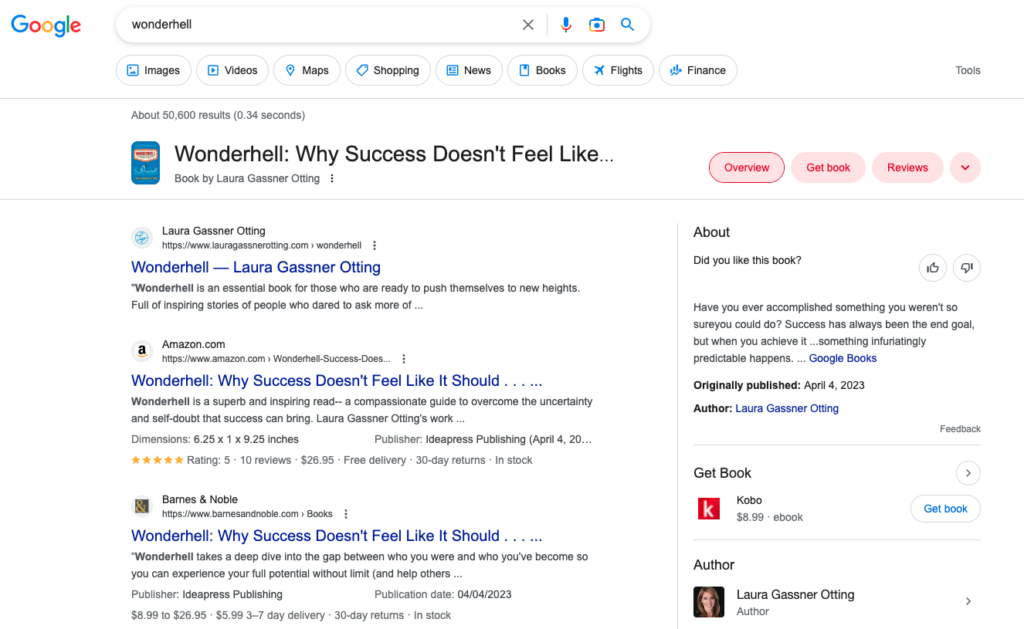The title tingle: How to know when you’ve got it
Start with this: the purpose of a title is as a handle for your book. You can’t explain a whole book in a few words, but you can often come up with a few words that people will connect with your book in their minds.
These are the qualities of an awesome title:
- Easy to remember.
- Connects to the idea of the book.
- Isn’t already the name of a popular book on the same topic. (Do a book search on Amazon to check.)
I recently was talking to an author about her book. The name of her key concept was striking. It combined two common words, but you wouldn’t normally see those words together. When I heard it, I felt a tingle.
Then I searched Amazon. There was nothing there. The tingle got stronger.
I searched Google. The first result was an article she’d written about the concept. She owned the Google search. The tingle got very strong.
Used GoDaddy to search for the domain. The dot-com was taken. But the dot-net and the dot-org were not. Now the tingle was overwhelming.
She wanted to add another word to the title to make the meaning clearer.
I practically screamed “No!” at the Zoom window.
Do you know how rare it is to have a set of words like that, words that you can own on Amazon, on Google, on the Web, and in the reader’s mind?
Of course those words don’t mean anything to a potential reader . . . yet. This is where your publicity and word of mouth kick in. Your subtitle can do some of the work of explaining. Your description on Amazon and on your website can do more. Don’t explain in the title — it’s a brand.
Where great titles come from
I don’t know. They come from inspiration you pluck out of the vacuum. They come from conversation. If you keep talking about your book, and if you have a listener who knows how to pick resonant word combinations out from the noise, that can help. You could always do a title brainstorm.
I know a great title when I hear one.

Wonderhell, Laura Gassner Otting’s just released book, has a great title. It’s not even a real word. The full title/subtitle is Wonderhell: Why Success Doesn’t Feel Like It Should . . . and What To Do About It. Doesn’t that make you want to know more? And she owns the URL, and dominates the Web search, and is the only book with that name on Amazon. I’m tingling.
Notice it’s not called “The Paradox of Wonderhell.” Don’t add words to a great title. Just appreciate it and buy the domain and explain it in the subtitle.
Looking at the business bestsellers on Amazon, Wisdom of the Bullfrog is a great title. Atomic Habits is a great title. Never Split the Difference is a good title. So is Start with Why. So is Radical Candor.
These books are successful because they are good books that generated lots of word of mouth. But the titles made it a lot easier to do that.
You can definitely have a good book without a great title. It’s not essential.
But if you can find one — if you feel that tingle because the words fit and nobody else is using them — then stop looking and lock it down!
I was listening to a book by the British scientist Richard Dawkins. He talked about how he had come to title his most famous book, The Selfish Gene, published by Oxford University Press. Dawkins said an American publisher would have made him add a subtitle. Have you found that U.S. publishers are more likely to require a subtitle?
I think all publishers would prefer a subtitle: if you have the space to explain, you should do it. In the case of Dawkins, the words “Dawkins” plus “Gene” would probably be sufficient. But in general, adding a subtitle is a good way to expand on the brief idea that the title promises.
There’s also the SEO benefit.
For Project Management in the Hybrid Workplace, I opted to omit a subtitle. My candidates were clunky and the title is pretty self-explanatory.